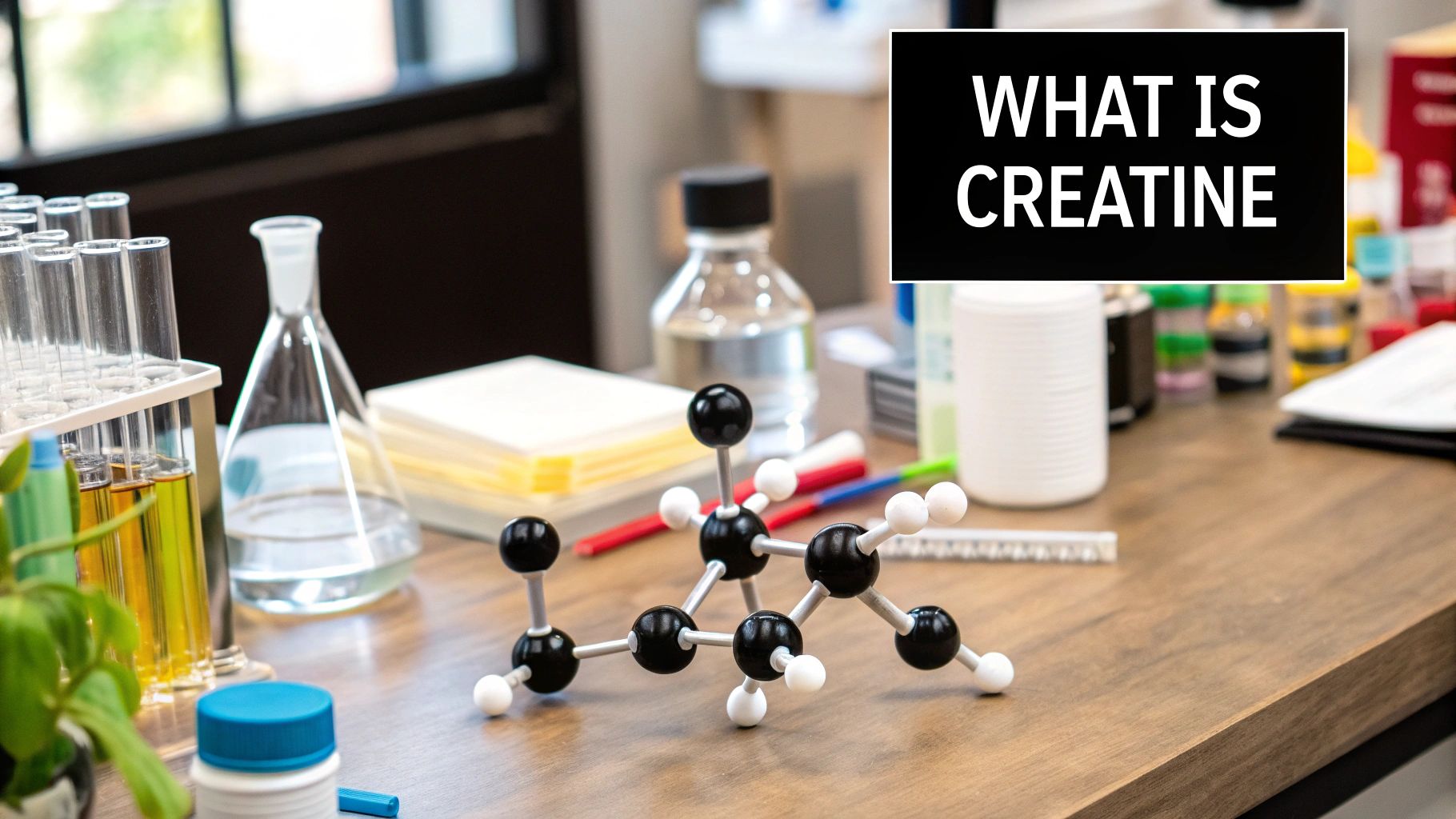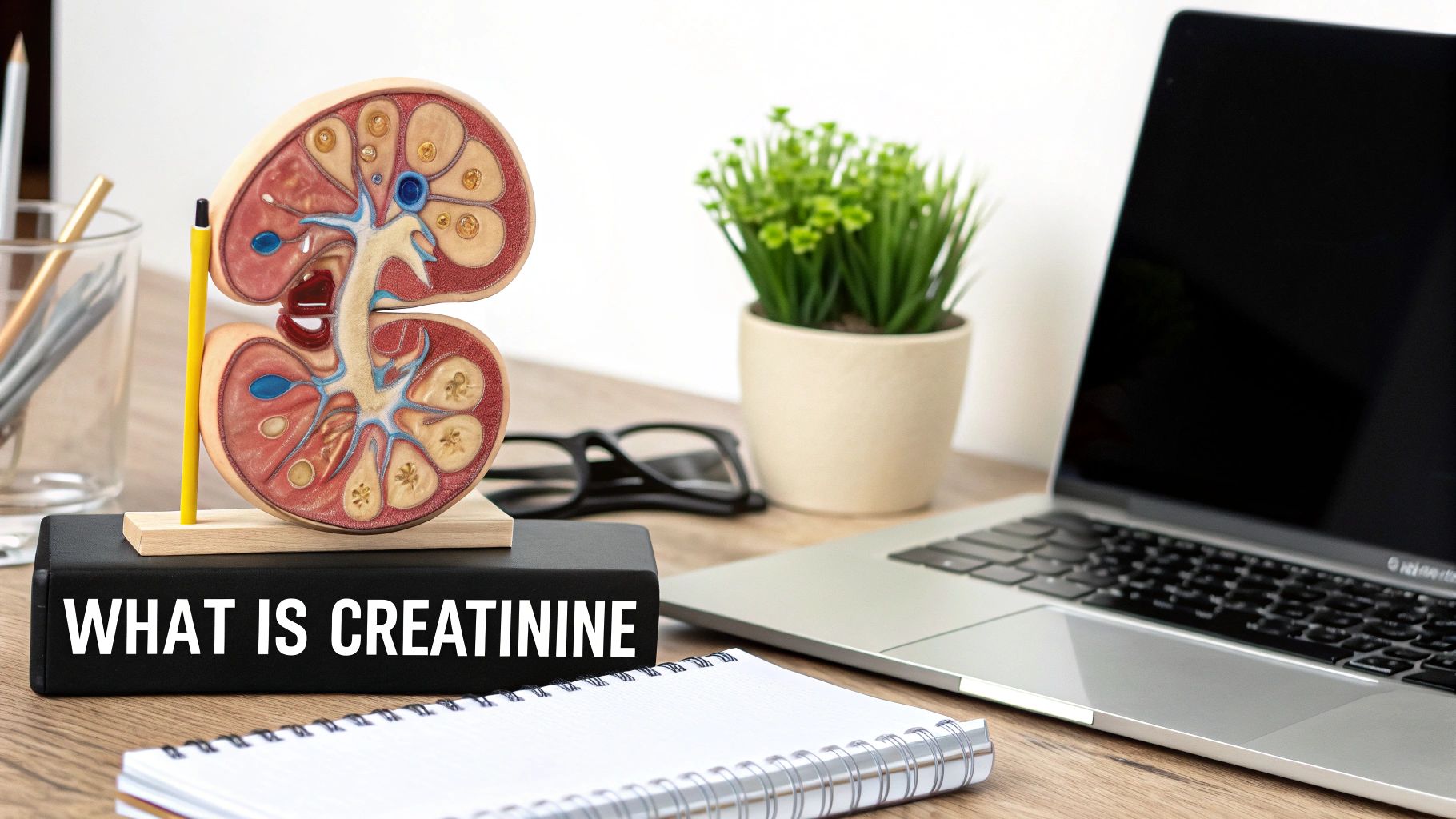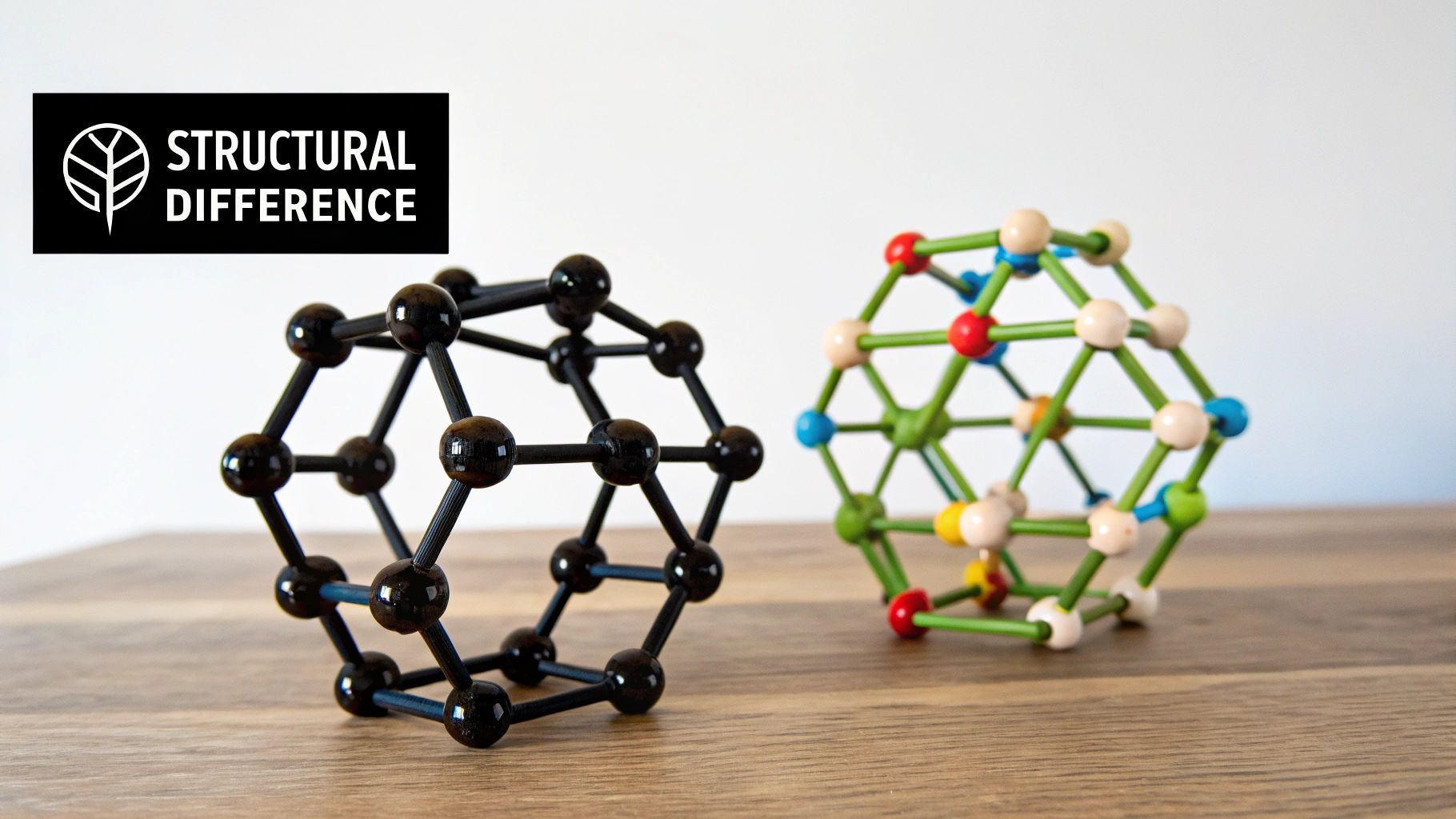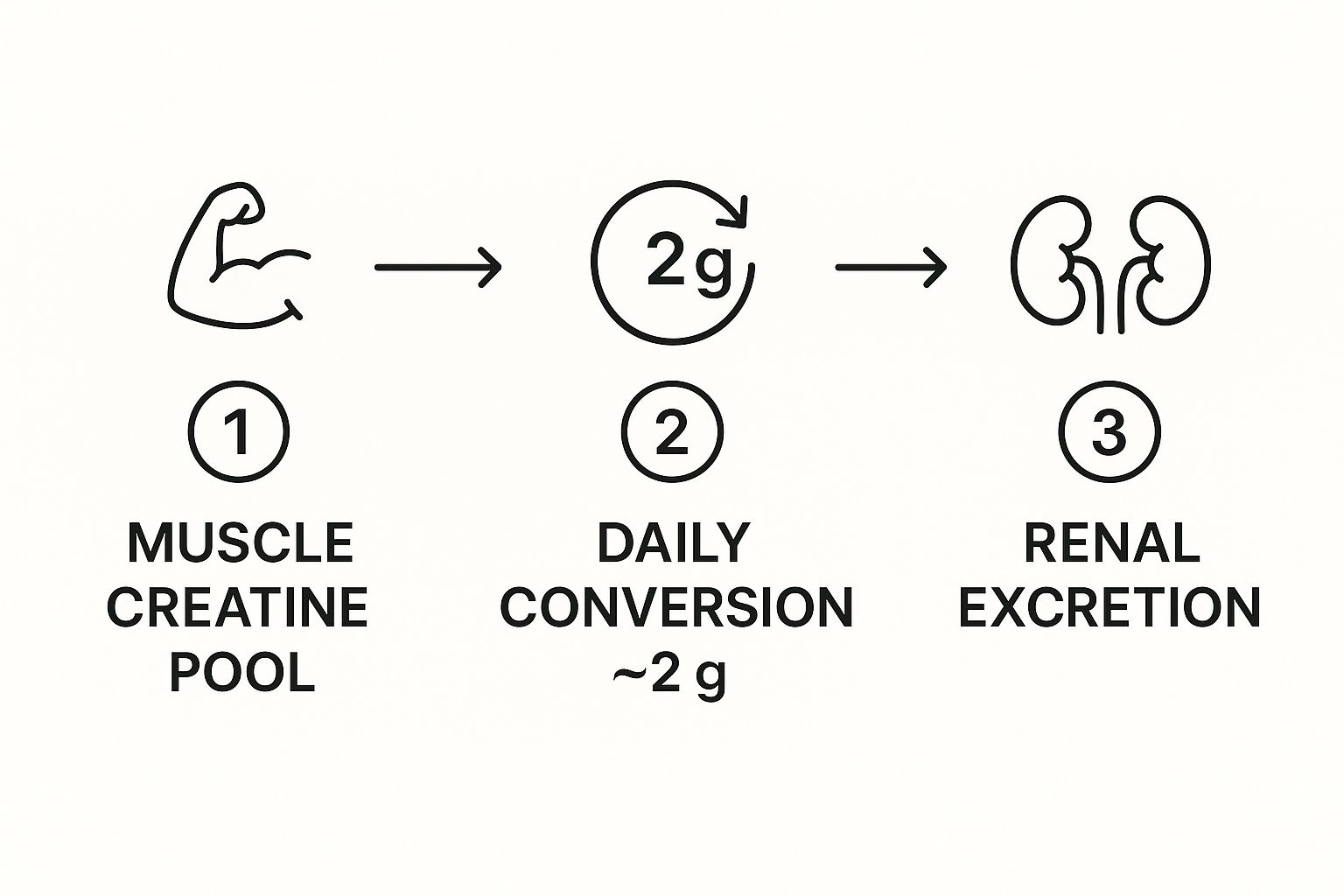
Understanding the Difference Between Creatine and Creatinine
Share
The core difference between creatine and creatinine boils down to their roles in your body. Creatine is a high-octane energy source your muscles tap into for powerful, explosive movements. Creatinine, on the other hand, is simply the waste product left over after your body uses creatine.
Think of it this way: creatine is the fuel you put in the tank for a heavy lifting session, while creatinine is the exhaust that comes out the tailpipe afterward.
Deconstructing Creatine and Creatinine
Although their names are strikingly similar, these two molecules couldn't be more different in how they function within your body's complex biochemistry. It's an easy mix-up, especially if you're just starting to explore fitness supplements. But getting their roles straight is crucial for understanding everything from athletic performance to vital health markers, particularly when it comes to your kidneys.
In short, one is a valuable asset your body puts to work, and the other is a metabolic signpost that doctors use to check on your health.
A Tale of Two Molecules
Creatine is a naturally occurring organic acid that plays a pivotal role in supplying energy to cells throughout your body, with a heavy concentration in your muscles. It works by helping to rapidly regenerate adenosine triphosphate (ATP), which is your body’s primary currency for energy. Its impact is so profound that it’s become one of the most popular and scientifically-backed supplements for anyone looking to boost strength and exercise performance.

Creatinine, however, has no active biological job to do. It’s simply what’s left after the natural breakdown of creatine in your muscle tissue. Your kidneys are responsible for filtering this waste product from your blood and flushing it out in your urine. This is precisely why creatinine levels in your blood and urine are such critical biomarkers; they give doctors a clear window into how well your kidneys are functioning. You can learn more about the importance of creatinine testing in kidney health.
The Bottom Line: Creatine is a functional compound that fuels muscle performance. Creatinine is a non-functional byproduct used as a key indicator of kidney health. They're directly linked, but one is a resource and the other is a result.
Creatine vs Creatinine Key Distinctions at a Glance
To make the comparison crystal clear, here’s a quick table breaking down their fundamental differences. This should help you immediately see why these two substances are on opposite ends of the metabolic spectrum.
| Attribute | Creatine | Creatinine |
|---|---|---|
| Primary Role | An energy-storing compound for muscle | A waste product from creatine metabolism |
| Main Function | Fuels short, intense bursts of activity | Serves as an indicator of kidney function |
| Location | Stored primarily in skeletal muscle | Found in the bloodstream and excreted in urine |
| Usage | Widely used as a performance supplement | Not used as a supplement; measured in tests |
Ultimately, understanding this distinction is key for anyone using creatine supplements, as it helps you interpret health information and have more informed conversations with your doctor about your kidney function and overall wellness.
What Is Creatine? The Fuel for Your Muscles
Creatine is an organic acid your body produces all on its own, and it's absolutely crucial for providing quick bursts of energy to your muscles. Think of it as the turbo-boost for your cells—delivering a surge of power exactly when you need it for short, intense efforts like a heavy deadlift or an all-out sprint.

This vital compound gets made in your liver, kidneys, and pancreas from a few key amino acids. From there, about 95% of it heads straight to your skeletal muscles where it's stored as phosphocreatine. It just sits there, waiting to be called into action to rapidly regenerate adenosine triphosphate (ATP), which is the primary fuel source for everything your body does.
Fueling Performance and Growth
At its core, creatine’s job is to supercharge the ATP-PC (adenosine triphosphate-phosphocreatine) energy system. This is your body's go-to for immediate power during activities that last less than 10 seconds. By having more creatine stored up, you can sustain that high-intensity output just a little longer and bounce back faster between sets.
This direct line to energy production is exactly why creatine supplements have become a non-negotiable for so many athletes and gym-goers. The science is solid, and the real-world benefits are clear:
- Increased Muscle Strength: It helps you lift heavier and push harder, session after session.
- Enhanced Power Output: This is a game-changer for explosive movements in sports like sprinting and jumping.
- Improved Muscle Growth: By allowing for more workout volume and helping hydrate muscle cells, it creates an ideal environment for growth.
- Faster Recovery Times: It can help reduce muscle soreness and speed up the repair process after a tough workout.
When you're serious about your training, you start paying close attention to what's in your supplements. For a deeper dive into this, it's worth checking out this guide on choosing a pre-workout supplement.
More Than Just Muscle
While creatine is famous for what it does in the gym, some of the most exciting new research is looking at its role in cognitive health. Your brain is a massive energy hog, and studies are starting to suggest that creatine might help improve short-term memory and reasoning, especially when you're under stress or haven't had enough sleep.
The trust and popularity of creatine are easy to see in its market growth. Naturally found in meat and fish, it’s a cornerstone of muscle energy, and the supplement market is booming. To put it in perspective, the U.S. creatine market was valued at around USD 139.4 million and is projected to keep growing.
The Bottom Line: Creatine is a direct energy source for powerful muscle contractions, making it a foundation for improving strength, power, and muscle mass. But its benefits don't stop at the gym door; it's also showing promise for supporting brain function.
With so many forms out there, from powders to pills, picking the right one can feel overwhelming. If you’re after a simple and tasty option, our guide on creatine gummies has all the info you need. This isn't just another supplement; it's a fundamental part of how your body produces power.
Understanding Creatinine: The Kidney Health Barometer
While creatine is all about fueling your muscles for action, creatinine tells a completely different story. Think of it as the metabolic footprint left behind after your muscles do their work and creatine breaks down. Creatinine has no active biological job; its value is purely diagnostic, giving doctors a window into your internal health.

This waste product is created at a pretty constant rate from the natural, daily turnover of creatine phosphate in your muscles. From there, it makes its way into your bloodstream and travels directly to your kidneys. Healthy kidneys are incredibly efficient at filtering it out of your blood and sending it out of the body through urine.
This whole filtration process is exactly why creatinine tests are so vital in medicine. By measuring its concentration in your blood, doctors get a reliable snapshot of how well your kidneys are performing. It’s a standard, and very important, part of routine blood work.
Interpreting Your Creatinine Levels
Your creatinine reading isn't a universal number; what's "normal" for one person might not be for another. Several personal factors can shift the baseline, and understanding them is crucial for making sense of your results.
A few key things influence your creatinine levels:
- Muscle Mass: More muscle means more creatine turnover, which naturally leads to higher creatinine levels. This is the biggest factor.
- Age: As we get older, muscle mass tends to decrease, which can cause creatinine levels to drop.
- Sex: Men typically have more muscle mass than women, so their normal creatinine range is generally higher.
- Diet: Eating a lot of cooked red meat can cause a temporary bump in creatinine, as the cooking process converts some of its creatine into creatinine.
High creatinine can be a signal that your kidneys are struggling to filter waste properly. On the flip side, unusually low levels might point to other issues like reduced muscle mass or even certain liver conditions.
It’s a simple measurement that provides a powerful look at what's going on inside.
What High or Low Levels Can Signify
A consistently high creatinine level is often the first red flag for kidney problems, from infections to chronic kidney disease. But it's important not to panic. Temporary factors, like being dehydrated or having a really intense workout, can also cause a short-term spike.
Low creatinine is less common but can be just as telling. It might suggest conditions causing muscle wasting, severe liver disease, or a diet extremely low in protein. In either case, an abnormal result is a signal to have a more in-depth conversation with your doctor.
Your doctor will look at your creatinine levels in the context of your entire health picture to figure out what's really going on. This is the core difference between creatine and creatinine—one is a supplement for power, while the other is a vital report card on your kidney function.
How Your Body Converts Creatine to Creatinine
The connection between creatine and creatinine is more than just a similar name—it’s a direct biochemical pathway. Getting a handle on this process is the key to understanding the real difference between creatine and creatinine. Simply put, your body is constantly turning its stored energy potential into a waste product in a very predictable way.
This conversion is a natural, non-enzymatic process. That means it happens spontaneously inside your muscles without needing a specific enzyme to trigger it. A portion of your stored phosphocreatine (the high-energy form) loses its phosphate group, curls up on itself, and permanently becomes creatinine. Think of it as a slow, steady leak from your muscles’ energy reservoir.
A Stable and Predictable Process
What’s really important here is how consistent this conversion is. Your body breaks down its creatine stores into creatinine at a remarkably stable rate, typically around 1-2% of your total muscle creatine pool every single day. The exact amount depends almost entirely on how much muscle mass you have.
Because this conversion happens like clockwork, the amount of creatinine your body produces and releases into the bloodstream stays very steady from day to day. Someone with more muscle has a larger creatine pool, so they'll naturally produce more creatinine, but their personal level will be consistent.
This predictable conversion rate is exactly why doctors use creatinine levels in blood tests as a reliable marker. Since your body makes it at a steady pace, a significant jump or dip in your blood levels usually points to a change in how well your kidneys are filtering it out.
The image below shows how creatine stored in your muscles gets converted and then cleared out by the kidneys.

This flow highlights a simple fact: a bigger muscle creatine pool will naturally lead to more creatinine being sent to the kidneys for removal.
The Impact of Creatine Supplementation
This brings us to a common point of confusion, especially for anyone taking creatine. When you supplement with creatine, you’re significantly increasing the amount of creatine stored in your muscles. As a result, that stable 1-2% daily conversion rate is now applied to a much larger pool.
It’s simple math—more creatine in, more creatinine out. This leads to a predictable and harmless rise in your blood creatinine levels, which can sometimes trigger unnecessary alarm bells during a routine physical. This slight elevation doesn't mean your kidneys are under strain; it’s just a direct reflection of having more raw material available for the conversion process.
Does Creatine Supplementation Affect Kidney Health?
This is the million-dollar question, isn't it? It's probably the single most common concern I hear from people thinking about adding creatine to their routine. Let's get right to it: for people with healthy kidneys, the overwhelming body of research shows that creatine is safe.
The confusion, and it's an understandable one, comes from the fact that taking creatine will raise your blood creatinine levels. This is not a sign of a problem; it's an expected and normal outcome.
Why Your Creatinine Levels Go Up
Think back to what we've covered. Your body naturally breaks down about 1-2% of its stored muscle creatine into creatinine every single day. When you start supplementing, you're simply increasing that total pool of creatine available in your muscles. More creatine in the tank means a little more creatinine is produced as a byproduct, which your kidneys then filter out.
So, while your creatinine numbers on a lab report will go up, your kidneys aren't struggling. They're just doing their job with the slightly higher workload you've given them.
Elevated Creatinine Needs Context
For a doctor looking at a standard blood test, a high creatinine level can be a red flag for kidney issues. It often means the kidneys aren't filtering waste from the blood as efficiently as they should. This is where context is absolutely critical.
For a healthy person taking creatine, that same elevated reading means something entirely different. It’s crucial to separate a rise in creatinine caused by a larger creatine supply from one caused by poor kidney function. The kidneys are still working just fine; they're just processing more of this specific byproduct because the supplement is working.
Key Takeaway: An elevated creatinine level in a healthy person taking creatine reflects increased creatine breakdown, not decreased kidney function. Context is everything when interpreting these lab results.
What Does the Science Say?
The old myth that creatine harms the kidneys has been thoroughly and persistently debunked. Study after study has confirmed that, for healthy individuals, both short-term and long-term creatine use is perfectly safe for the kidneys.
In fact, the evidence just keeps getting stronger. One recent, large-scale analysis used data from over 1,100 creatine users and found no statistical connection between creatine supplementation and any signs of kidney problems. You can dig into the specifics of this comprehensive study on creatine and renal health yourself.
This consistent evidence should offer some serious peace of mind. The bump in creatinine is just a benign biomarker change, not a sign that anything is wrong. And if you're curious about how creatine works beyond just muscle, our guide on the benefits of creatine for women explores its cognitive and physical advantages. Ultimately, the difference between creatine and creatinine is simple: one is a powerful performance tool, and the other is just its harmless metabolic echo.
It can be unsettling to get a lab report back and see a high creatinine number, especially if you're taking creatine supplements. The first thing to remember is not to panic. A slight bump in creatinine is often a completely normal and harmless side effect for healthy people who supplement with creatine. It doesn't automatically mean your kidneys are in trouble.
That said, you should never brush off your lab results. The key is to know when that number is just a reflection of your supplement use versus when it might signal something worth discussing more seriously with your doctor. Arming yourself with the right information lets you have a more productive conversation about your health.
Benign Side Effect or Cause for Concern?
So, how do you tell the difference between a normal, supplement-related rise and a genuine red flag? While your doctor is the ultimate authority, you should pay close attention if your high creatinine levels come with other symptoms.
Look out for these warning signs, which could suggest the issue goes beyond your creatine intake:
- Persistent Fatigue or Weakness: This is a level of exhaustion that feels deeper than typical muscle soreness after a workout.
- Swelling (Edema): Are your ankles, feet, or hands looking unusually puffy?
- Changes in Urination: This could mean you're urinating less often than normal, or maybe you've noticed your urine is foamy.
- Nausea or Loss of Appetite: A general, persistent feeling of being unwell that you can't chalk up to a tough workout or something you ate.
Crucial Advice: Make sure you tell your doctor about all your supplements, including creatine, before you get your blood drawn. This context is absolutely essential for them to interpret your results correctly and can save you from a lot of unnecessary worry.
When you're open with your doctor, they can look at the whole picture. They'll consider your overall health, other key markers like your estimated glomerular filtration rate (eGFR), and any symptoms you're experiencing. This complete view helps them figure out if your creatinine level is simply a sign of your active lifestyle or if it's a signal that your kidney health needs a closer look.
Clearing Up Common Questions About Creatine and Creatinine
Let's dive into some of the most frequent questions people have about creatine and creatinine. Getting these answers straight is key to feeling confident about your supplement routine and understanding your health.
Will Taking Creatine Automatically Damage My Kidneys?
This is probably the biggest myth out there, and the short answer for healthy people is a resounding no. Countless studies have looked into this, and the consensus is clear: creatine supplementation is safe for those with normal kidney function.
Seeing your creatinine levels go up after starting creatine is a normal, expected result—it's not a sign your kidneys are under stress. Your body just has more raw creatine to process, which naturally results in more of the waste product, creatinine. Think of it like a busy kitchen: more cooking (muscle energy production) naturally leads to more trash (creatinine) to take out, but it doesn't mean the kitchen is broken.
The Key Takeaway: For healthy individuals, the idea that creatine supplementation causes kidney damage has been consistently debunked by scientific research. The rise in creatinine is simply a predictable metabolic side effect, not a red flag for kidney problems.
How Much of a Creatinine Increase Should I Expect?
There isn't a one-size-fits-all answer here. The amount your creatinine increases will depend on your supplement dose, how much muscle you carry, your diet, and your unique metabolism. Still, seeing a slight bump that pushes your levels just outside the standard reference range on a lab report is pretty common and not usually a cause for worry.
The most important thing you can do is give your doctor a heads-up that you're taking creatine before you get any blood work done. That context is crucial. It helps them interpret your results correctly and understand that the rise is likely from the supplement, not from an underlying health issue. This simple conversation can save you a lot of unnecessary stress and follow-up tests.
Should I Stop Taking Creatine Before a Blood Test?
That’s a great question, and it’s a smart move. If you want to get a true baseline reading of your kidney function, it's wise to pause your creatine supplementation for at least a week—or even longer if you can—before a blood test. This gives your body enough time for its creatine and creatinine levels to fall back to your normal, non-supplemented state.
This ensures your doctor sees the clearest possible picture of your underlying kidney health. And for anyone looking to dial in their routine, this in-depth creatine dosage guide offers fantastic advice for every level of experience.
At Smash.com, we believe sticking to your creatine plan should be easy and enjoyable. Ditch the messy powders for our premium creatine gummies. Each serving delivers your full 5g dose in a delicious, convenient form. Fuel your workouts, hit your goals, and actually enjoy your supplements. Check out our game-changing gummies at https://smash.com.